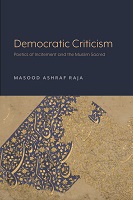Democratic Criticism
Poetics of Incitement and the Muslim Sacred
Abstract
After the publication of Salman Rushdie’s The Satanic Verses (1988), the poetics of incitement— found in texts originating in the West containing themes and representations of Islam hurtful to Muslims—became an accepted method of textual production in the West. Production of such texts intensified after the attacks of 9/11. Democratic Criticism: Poetics of Incitement and the Muslim Sacred by Masood Ashraf Raja urges a new mode of reading, one that permits Western readers to transcend local reading practices in order to, as best as one can, read from the point of view of the Other.
Raja argues that the lack of understanding of Muslim responses to the poetics of incitement in the West is the result of a lack of cross-cultural knowledge. He claims metropolitan universities often do not teach the proper social, historical, and religious context required for effectively reading these texts with any form of cultural knowledge. To remedy this, Raja offers and theorizes “democratic reading practices” and new ways for students to engage with texts. A genealogy of the Muslim Sacred is included, thereby giving readers the history and specific knowledge that constitutes an average Muslim reader of these texts, a subject who should be imagined and empathized with when those in the West read works of the poetics of incitement.
Democratic Criticism encourages Western readers to develop a deeper understanding of the meaning-making processes of the Islamic world while at the same time encouraging the Muslim readers to read representations of the Islamic world with a more expansive understanding. It will be a helpful tool in creating reading practices that allow both teachers and students of literature to transcend their mode of reading as universal and to read from the perspective of the Other, and allow readers to engage meaningfully with these texts. Students and scholars of world literature, history, and religious studies will find this book insightful and valuable.
Keywords
Muslim, Modes of Reading, Salman Rushdie, Islam, Satanic Verses, Khomini, Fatwa, Sacred, Postcolonial, modernity, Literature, Controversy, responses, critics, The jewel of Madina, Al Tabri, Islamic, modes, thinking, prophet, Mohammed, freedom of speech, The Rushdie affairDOI
10.3998/mpub.12682261ISBN
9781643150451, 9781643150468Publisher
Lever PressPublisher website
https://www.leverpress.org/Publication date and place
2023Classification
Literature: history and criticism
Islam


 Download
Download